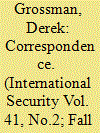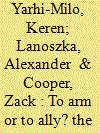|
|
|
Sort Order |
|
|
|
Items / Page
|
|
|
|
|
|
|
| Srl | Item |
| 1 |
ID:
149254


|
|
|
|
|
| Summary/Abstract |
This article expands the study of the politics of international criminal justice, restoring the crucial but overlooked case of Bangladesh, today the largest population confronting the aftermath of genocide. Bangladesh is one of the most important cases where the prosecution of war criminals was foiled, resulting in a disturbing impunity for one of the bloodiest incidents of the Cold War. Using unexplored declassified Indian government documents from archives in Delhi, this article uses detailed process-tracing to reveal for the first time why India and Bangladesh abandoned their plans to put accused Pakistani war criminals on trial after the 1971 war between India and Pakistan. In the face of Pakistani defiance, the Indian and Bangladeshi governments reluctantly bargained away justice in order to pursue their national security, with peacemaking with Pakistan proving more important than war crimes trials. This episode furthers the general understanding of both the causes and results of impunity for mass atrocities, while extending the study of international justice into Asia. Bangladesh's tragic experience shows the primacy of international security, while also tentatively suggesting that even when amnesty is necessary for peacemaking, it can leave a toxic legacy for future politics.
|
|
|
|
|
|
|
|
|
|
|
|
|
|
|
|
| 2 |
ID:
149255


|
|
|
| 3 |
ID:
149256


|
|
|
| 4 |
ID:
149251


|
|
|
|
|
| Summary/Abstract |
What are the consequences of drone proliferation for international security? Despite extensive discussions in the policy world concerning drone strikes for counterterrorism purposes, myths about the capabilities and implications of current-generation drones often outstrip reality. Understanding the impact of drones requires separating fact from fiction by examining their effects in six different contexts—counterterrorism, interstate conflict, crisis onset and deterrence, coercive diplomacy, domestic control and repression, and use by nonstate actors for the purposes of terrorism. Although current-generation drones introduce some unique capabilities into conflicts, they are unlikely to produce the dire consequences that some analysts fear. In particular, drone proliferation carries potentially significant consequences for counterterrorism operations and domestic control in authoritarian regimes. Drones could also enhance monitoring in disputed territories, potentially leading to greater stability. Given their technical limitations, however, current-generation drones are unlikely to have a large impact on interstate warfare. Assessing the consequences of drone proliferation has important implications for a range of policy issues, including the management of regional disputes, the regulation of drone exports, and defense against potential terrorist attacks on the homeland.
|
|
|
|
|
|
|
|
|
|
|
|
|
|
|
|
| 5 |
ID:
149253


|
|
|
|
|
| Summary/Abstract |
How do great powers decide whether to provide arms to or form alliances with client states? This “patron's dilemma” revolves around a decision about how to best provide security to clients without becoming entrapped in unwanted conflicts. Strong commitments worsen the risk of entrapment, whereas weak commitments intensify fears of abandonment. This traditional alliance dilemma can be addressed through the provision of arms and alliances. Great power patrons primarily make such decisions on the basis of two factors: first, the extent to which the patron believes it and its client have common security interests; and second, whether the patron believes that its client has sufficient military capabilities to deter its main adversary without the patron's assistance. Patrons assess the degree of shared threat and the local balances of capabilities in determining whether to support their clients with arms, alliances, or both. As demonstrated in the U.S. provision of security goods to Taiwan and Israel during the Cold War, this strategic logic explains how great powers manage the patron's dilemma.
|
|
|
|
|
|
|
|
|
|
|
|
|
|
|
|
| 6 |
ID:
149252


|
|
|
|
|
| Summary/Abstract |
States frequently employ overt and covert foreign-imposed regime change (FIRC) to pursue their foreign policy interests. Yet there is little scholarship on the question of whether FIRCs improve relations between the states involved. In fact, most FIRCs either fail to reduce—or increase—the likelihood of militarized disputes between interveners and targets. Fundamentally, FIRC entails a principal-agent problem: foreign-imposed leaders rule over states with interests different from those of the intervener. Whereas the intervening state wants the new leader to pursue policies that reflect its interests, once in power, such leaders are focused on ensuring their political survival, a task that is often undermined by implementing the intervener's agenda. Foreign-imposed leaders who carry out the intervener's desired policies attract the ire of domestic actors. These domestic opponents can force the regime to reverse course or may even remove it from power in favor of leaders who are hostile to the intervener; in both cases, the result can be renewed conflict with the intervener. Rwanda's replacement of Mobutu Sese Seko with Laurent-Désiré Kabila in Zaire illustrates this problem.
|
|
|
|
|
|
|
|
|
|
|
|
|
|
|
|
|
|
|
|
|